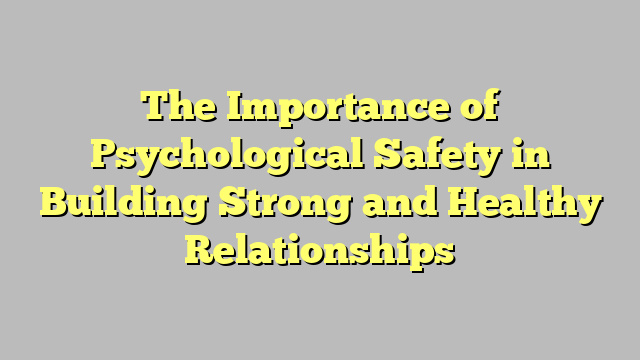The Importance of Psychological Safety in Building Strong and Healthy Relationships
The Importance of Psychological Safety in Building Strong and Healthy Relationships
Introduction
Building strong and healthy relationships is essential for our overall well-being and happiness. Whether it’s in our personal lives or professional environments, the quality of our relationships can greatly impact our mental and emotional health. One crucial factor that contributes to the success of any relationship is psychological safety.
What is Psychological Safety?
Psychological safety refers to an individual’s perception of feeling safe, accepted, and respected within a relationship. It is the belief that one can express their thoughts, ideas, and emotions without fear of judgment, rejection, or negative consequences. In a psychologically safe environment, individuals feel comfortable being vulnerable and taking risks, knowing that they will be supported and understood.
The Role of Psychological Safety in Relationships
Psychological safety plays a vital role in building strong and healthy relationships. Here are some reasons why it is crucial:
- Encourages Open Communication: When individuals feel psychologically safe, they are more likely to engage in open and honest communication. They can freely express their thoughts, concerns, and needs without fear of backlash or criticism. This open communication fosters trust and understanding, leading to stronger connections.
- Promotes Emotional Intimacy: Psychological safety allows individuals to share their emotions and vulnerabilities without the fear of being judged or rejected. This promotes emotional intimacy, as both parties feel comfortable expressing their true selves. Emotional intimacy is a key component of healthy relationships, as it deepens the bond and fosters empathy and support.
- Builds Trust: Trust is the foundation of any successful relationship. When individuals feel psychologically safe, they trust that their partner or colleague has their best interests at heart. They trust that their opinions and feelings will be respected and valued. This trust creates a sense of security and strengthens the relationship.
- Encourages Growth and Innovation: In psychologically safe environments, individuals are more likely to take risks and explore new ideas. They feel comfortable stepping outside their comfort zones, knowing that failure will be met with support and encouragement rather than judgment. This fosters growth and innovation within the relationship, leading to new opportunities and solutions.
Creating Psychological Safety
Creating psychological safety requires effort and intention from all parties involved. Here are some strategies to foster psychological safety in your relationships:
- Active Listening: Practice active listening by giving your full attention to the speaker and validating their thoughts and feelings. Avoid interrupting or dismissing their ideas, as this can create a sense of invalidation and hinder psychological safety.
- Encourage Feedback: Create an environment where feedback is welcomed and valued. Encourage others to share their thoughts and opinions, and be open to receiving constructive criticism. This promotes a culture of continuous improvement and shows that everyone’s voice is important.
- Show Empathy: Demonstrate empathy by putting yourself in the other person’s shoes and understanding their perspective. Validate their emotions and experiences, even if you may not fully agree. This helps create a safe space for open and honest communication.
- Lead by Example: Model the behavior you want to see in others. Be vulnerable and share your own thoughts and feelings, showing that it is safe to do so. This encourages others to follow suit and creates a culture of psychological safety.
The Impact of Psychological Safety in the Workplace
Psychological safety is not only important in personal relationships but also in the workplace. Research has shown that teams with high levels of psychological safety perform better and are more innovative. When employees feel safe to speak up, share ideas, and take risks, it leads to increased collaboration, creativity, and productivity.
On the other hand, a lack of psychological safety in the workplace can have detrimental effects. It can lead to a culture of silence, where employees are afraid to voice their opinions or concerns. This stifles innovation and hinders problem-solving. It can also result in increased stress, burnout, and turnover, as individuals do not feel supported or valued.
Conclusion
Psychological safety is a crucial element in building strong and healthy relationships, both personally and professionally. It creates an environment where individuals feel safe, accepted, and respected, allowing for open communication, emotional intimacy, trust, and growth. By actively fostering psychological safety in our relationships, we can create stronger connections and promote overall well-being and success.

